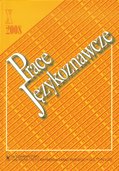Dwa kryteria empiryczności w językoznawstwie
Two criteria of empiricness in cognitive linguistics
Author(s): Hubert KowalewskiSubject(s): Language and Literature Studies, Cognitive linguistics, Western Slavic Languages, Philology
Published by: Wydawnictwo Uniwersytetu Warmińsko-Mazurskiego w Olsztynie
Keywords: methodology; empirical research; quantitative methods; qualitative methods
Summary/Abstract: In cognitive linguistics the term „empirical” tends to be associated with the useof quantitative methodology. According to the popular view, the „empiricness” of research iswarranted by the use numerically represented data processed by means of statistical methods.This kind of procedures are most readily associated with corpus studies and research involvingquestionnaires. Outside humanities, philosophers of science associate „empiricness” withthe procedure of hypothesis testing and they emphasize that testing requires a hypothesisof a certain logical form (falsifiability). The article explores the application of the two criteriaof „empiricness” (the criterion of quantitative methods and the criterion of falsifiability) inlinguistics with special emphasis on the cognitive paradigm.
Journal: Prace Językoznawcze
- Issue Year: 18/2016
- Issue No: 4
- Page Range: 107-118
- Page Count: 12
- Language: Polish

